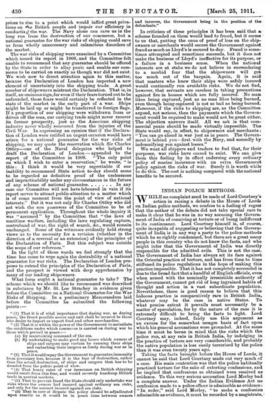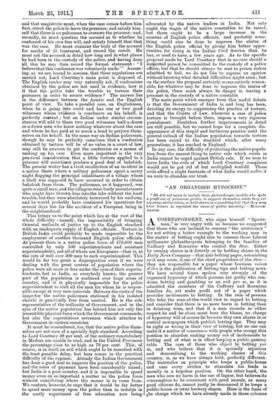INDIAN POLICE METHODS. [ RILE no complaint need be made of
Lord Courtney's action in raising a debate in the House of Lords on Indian police methods, we confess to a feeling of regret that the author of the debate did not take special care to make it clear that he was in no way accusing the Govern- ment of India of conniving at torture or of being indifferent to its continuance. Lord Courtney himself is, of course, quite incapable of suggesting or believing that the Govern- ment of India is in any way a party to the police methods which he so rightly condemned, but there are a great many people in this country who do not know the facts, and who might infer that the Government of India was directly responsible for the admitted evils. This is not the case. The Government of India has always set its face against the Oriental practice of torture, and has from time to time stiffened its police regulations in the hope of making this practice impossible. That it has not completely succeeded is due to the broad fact that a handful of English officials, even when armed with the nominally irresistible authority of the Government, cannot get rid of long ingrained habits of thought and action in a vast subordinate population. Nevertheless, there is good reason to believe that this hideous practice is comparatively rare in British India, whatever may be the case in native States. To what precise extent it prevails must necessarily be a matter of speculation, for by the nature of the case it is extremely difficult to bring the facts to light. Lord Courtney may, indeed, fairly use this argument as an excuse for the somewhat meagre basis of fact upon which his general accusations were grounded. At the same time it must be borne in mind that the risks which the police run, at any rate in British India, by indulging in the practice of torture are very considerable, and probably the native population is less easily terrorised by the police than it was even twenty years ago. Taking the facts brought before the House of Lords, it cannot be said that Lord Courtney made out very much of a case. His main contention was that the police habitually practised torture for the sake of extorting confessions, and he implied that confessions so obtained were received as evidence. To this very serious accusation Lord Morley had a complete answer. Under the Indian Evidence Act no confession made to a police officer is admissible as evidence: " In order," said Lord Morley, " to make a. confession admissible as evidence, it must be recorded by a magistrate.- and that magistrate must, when the case comes before him first, direct the police to leave the premises, and satisfy him- self that there is no policeman to overawe the prisoner; and, secondly, he must question the accused as to whether he confessed of his own free will, and satisfy himself that that was the case. He must examine the body of the accused for marks of ill treatment, and record the result. He must ask the accused in detail how long and in what places he had been in the custody of the police, and having done all this he may then record the formal statement : I believe that this confession was voluntarily made.' " Assum- ing, as we are bound to assume, that these regulations are carried out, Lord Courtney's main point is disposed of. The English reader may very naturally ask, if confessions obtained by the police are not used in evidence, how is it that the police take the trouble to torture their prisoners in order to secure evidence ? The answer lies in the difference between the Asiatic and the English point of view. To take a parallel case, an Englishman, when he is going into court and has one or two good witnesses whose evidence is conclusive on his behalf, is perfectly content ; but an Indian under similar circum- stances will add to these two good witnesses half-a-dozen or a dozen men who know nothing whatever about the case and whom he has paid at so much a head to perjure them- selves on his behalf. In the same way an Indian policeman, though he may be perfectly conscious that a confession obtained by torture will be of no value in a court of law, may still be anxious to get the confession as a means of making up his case. Even more important is the very practical consideration that a little torture applied to a prisoner will sometimes produce a good deal of bakshish. The present writer has a vivid recollection of an incident in a native State where a solitary policeman spent a merry night flogging the principal inhabitants of a village where a theft was supposed to have occurred in order to obtain bakshish from them. The policeman, as it happened, was quite a small man, and the villagers were burly mountaineers ' who might have thrown him into the lake without the least trouble, but they were absolutely terrorized by his uniform, and he would probably have continued his operations for several days but for the accident of a European being in the neighbourhood.
This brings us to the point which lies at the root of the whole difficulty—namely, the impossibility of bringing Oriental methods of justice up to the English standard with an inadequate supply of English officials. Torture in British India could probably be made impossible by the employment of another thousand English police officials. At present there is a native police force of 176,000 men controlled by only 530 superintendents and assistant superintendents, not all of whom are Europeans—that is, at the rate of well over 300 men to each superintendent. This would be far too great a disproportion even if we were dealing with the great centres of population where the police were all more or less under the eyes of their superin- tendents, but in India, as everybody knows, the greater part of the population is scattered over huge areas of country, and it is physically impossible for the police superintendent to visit all the men for whom he is respon- sible except at very rare intervals. Between the visits of the inspector the native policeman stationed in his isolated chowki is practically free from control. He is the sole representative of the authority of Government, and in the eyes of the native population has behind him not only the irresistible physical force which the Government commands, but also the superstitious reverence which attaches to Government in eastern countries.
It must be remembered, too, that the native police them- selves are not men of a specially high standard. According to Lord Courtney 48 per cent. of the ordinary constabulary in Madras are unable to read, and in the United Provinces the percentage rises to as high as 78 per cent. This, of course, is in itself an evil which ought to be remedied with the least possible delay, but here comes in the practical difficulty of the expense. Already the Indian Government has done a good deal to improve the position of the police, and the rates of payment have been considerably raised ; but India is a poor country, and it is impossible to spend money even on so important a matter as the police force without considering where the money is to come from. We venture, however, to urge that it would be far better to spend more money upon the police than to indulge in the costly experiment of free education now being advocated by the native leaders in India. Not only ought the wages of the native constables to be raised, but there ought to be a large increase in the number of English police officials, and probably some- thing could also be done to improve the status of the English police official by giving him better oppor- tunities for rising in the Indian Civil Service than he has, or used to have, a few years ago. As to the specific proposal made by Lord Courtney that in no case should a suspected person be committed to the custody of a police officer, but that he should always be sent to prison unless admitted to bail, we do not like to express an opinion without knowing what detailed difficulties might arise ; but on the surface the proposal certainly seems entirely reason- able, for whatever may be done to improve the status of the police, there must always be danger in leaving a prisoner in the custody of a native constable.
The main point which emerges from this useful debate is that the Government of India is, and long has been, devoting its energy to suppressing the practice of torture, and that the Courts of Law, whenever a case of police torture is brought before them, impose a very rigorous punishment. Doubtless further improvements in detail are still possible, but we cannot hope for a complete dis- appearance of this stupid and barbarous practice until the general outlook of the Indian population towards torture has been raised to the standard which, after many generations, it has reached in England. In any case, the difficulty of protecting the native popula- tion from the nearest thing to native rule which exists in India cannot be urged against British rule. If we were to leave India the evils of which Lord Courtney complains would not be got rid of but multiplied tenfold. Those evils afford a slight foretaste of what India would suffer it we were to abandon our trust.











































 Previous page
Previous page